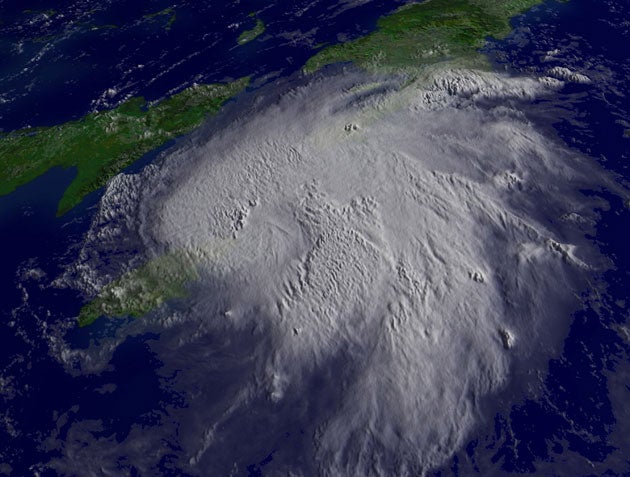Warming oceans 'are the engine driving stronger hurricanes'

Your support helps us to tell the story
From reproductive rights to climate change to Big Tech, The Independent is on the ground when the story is developing. Whether it's investigating the financials of Elon Musk's pro-Trump PAC or producing our latest documentary, 'The A Word', which shines a light on the American women fighting for reproductive rights, we know how important it is to parse out the facts from the messaging.
At such a critical moment in US history, we need reporters on the ground. Your donation allows us to keep sending journalists to speak to both sides of the story.
The Independent is trusted by Americans across the entire political spectrum. And unlike many other quality news outlets, we choose not to lock Americans out of our reporting and analysis with paywalls. We believe quality journalism should be available to everyone, paid for by those who can afford it.
Your support makes all the difference.The destructive intensity of the winds caused by tropical storms and hurricanes has increased significantly in the past 30 years, in line with the theory that cyclones are becoming stronger because of global warming, scientists said yesterday.
A study of satellite data going back 25 years has found that tropical storms in the North Atlantic and the Indian Ocean are getting significantly stronger and therefore more likely to develop into hurricanes with wind speeds greater than 100mph.
The findings support the idea that the ocean acts like a "heat engine" driving tropical cyclones. The theory is that as more heat builds up in the oceans, the more energy there is to become converted into the strongest winds of hurricanes.
In 1981, the average wind speed of 90 per cent of hurricanes monitored globally by satellite came to 139 mph but, by 2006, that speed had increased to 157mph, said Professor James Elsner of Florida State University in Tallahassee.
"This has been somewhat controversial but I think the evidence is fairly compelling from our study that the strongest tropical storms and cyclones are getting stronger. With all other things being equal, we believe the warmer the oceans become, the bigger the maximum intensity of the storms," he said.
"As the seas warm, the ocean has more energy that can be converted to tropical cyclone wind. Our results do not prove the heat-engine theory. We just show that the data is quite consistent with it," he said.
Tropical cyclones, which include hurricanes, typhoons and tropical storms, occur on average about 90 times a year. The researchers analysed hurricane intensities for all tropical cyclones occurring around the globe during the 25-year period and looked at the maximum wind speeds recorded for each one.
The idea that warmer oceans could result in stronger hurricanes was suggested in 2005 by Kerry Emanuel of the Massachusetts Institute of Technology, who was one of the first to find support for the theory.
Dr Emanuel said at the time: "My results suggest that future warming may lead to an upward trend in tropical cyclone destructive potential and – taking into account an increasing coastal population – a substantial increase in hurricane-related losses in the 21st century."
The latest findings of Professor Elsner, published in the journal Nature, lend powerful support to the idea. "I think there is some reason to believe that as the oceans continue to warm, it's likely that there will be an increase in energy that could result in an increase in intensity of storms," he said.
However, storm intensity is not simply the result of ocean temperatures, he added. "We still do not have a complete understanding of why some cyclones intensify, sometimes quite rapidly, and others don't," he said.
Join our commenting forum
Join thought-provoking conversations, follow other Independent readers and see their replies
Comments